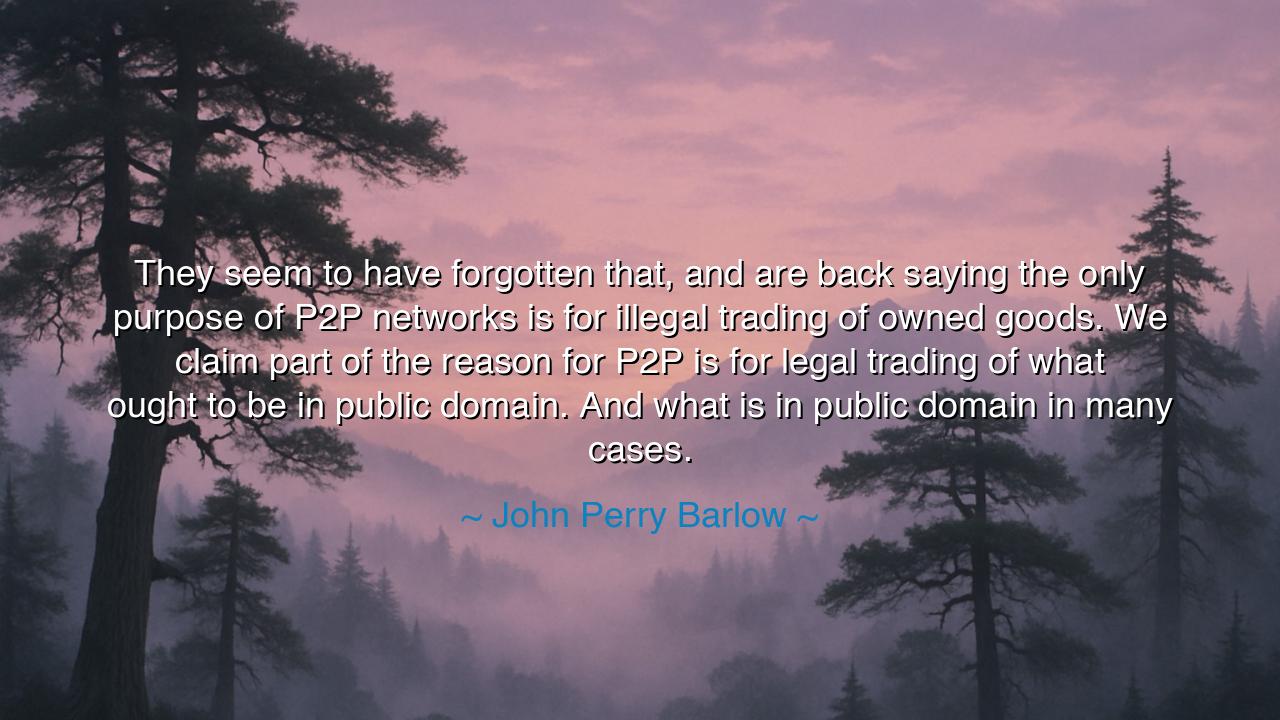
They seem to have forgotten that, and are back saying the only
They seem to have forgotten that, and are back saying the only purpose of P2P networks is for illegal trading of owned goods. We claim part of the reason for P2P is for legal trading of what ought to be in public domain. And what is in public domain in many cases.






When John Perry Barlow declared, “They seem to have forgotten that, and are back saying the only purpose of P2P networks is for illegal trading of owned goods. We claim part of the reason for P2P is for legal trading of what ought to be in public domain. And what is in public domain in many cases,” he was defending not merely a technology, but a philosophy — a vision of human knowledge as a river meant to flow freely, nourishing all who drink from it. His words resound with the spirit of rebellion that has always accompanied progress — the same defiance that drove thinkers of old to challenge kings, priests, and monopolies over truth. For Barlow, freedom of information was not theft; it was enlightenment, the very essence of human advancement.
The origin of this quote lies in the fiery debates of the early 2000s, when peer-to-peer (P2P) networks like Napster and Gnutella transformed the digital world. To governments and corporations, these technologies were dangerous — tools of piracy that threatened their ownership of music, books, and art. But to Barlow, one of the founding voices of the Electronic Frontier Foundation, they were instruments of liberation. He saw in P2P not a crime, but a continuation of the human desire to share knowledge, to connect, to democratize creation. His words were a protest against a world that had begun to treat ideas as property rather than gifts of the collective mind.
Barlow’s defense of the public domain echoes the wisdom of the ancients who believed that knowledge belongs to all. In the libraries of Alexandria, scholars gathered the wisdom of nations without thought of ownership; in the monasteries of the Middle Ages, monks preserved ancient texts so that truth might survive empires. To lock away knowledge behind walls of profit, Barlow argued, was to betray the very purpose of civilization. The public domain, to him, was sacred ground — the shared inheritance of humanity, a treasury built by countless generations of creators, thinkers, and dreamers. To restrict access to it was not justice; it was amnesia — a forgetting of who we are and what we owe to one another.
There is a moral power in his accusation — “They seem to have forgotten that.” He speaks not with rage, but with sorrow, as though watching a once-free people enslave themselves by choice. In his eyes, the digital world was meant to be a new frontier — a boundless realm where ideas could travel faster than greed, and where the commons of information could be restored. Yet instead of embracing this freedom, society began to repeat the sins of the past: enclosing the fields of creativity, building walls where there should be roads. Barlow’s warning was timeless — that technology alone does not make us free; it is our values that must guide it.
To illustrate his point, one might recall the tale of Prometheus, who stole fire from the gods to give to mankind. The fire, like information, was meant to illuminate, to empower, to awaken. Yet even as Prometheus gave humanity this divine gift, the gods punished him for breaking their monopoly on power. In the modern age, Barlow stood as a kind of digital Prometheus — not stealing, but reminding humanity that fire, once given, cannot be owned. Ideas, like flame, lose their purpose when confined. They are meant to spread, to light new torches, to kindle the progress of all.
His words challenge every generation to consider what truly belongs in the public domain. Is it just ancient texts and expired patents? Or is it the growing body of human knowledge that, by moral right, belongs to everyone? Barlow’s vision was not lawless anarchy, but ethical abundance — a balance where creators are respected, yet knowledge remains a living stream rather than a stagnant reservoir. He called for wisdom: to distinguish between stewardship and ownership, between protecting art and imprisoning it.
Let this quote, then, be remembered as a torch passed down through the ages — a reminder that freedom of thought and access to knowledge are the pillars upon which all progress stands. The lesson is simple yet profound: defend the commons of the mind as fiercely as past generations defended their lands and liberties. Create, share, and honor those who came before you, but never let fear or profit extinguish the flame of human curiosity. For as Barlow taught, the public domain is not a loophole in law — it is the heart of civilization itself. And those who keep it alive keep the soul of humanity burning bright.






AAdministratorAdministrator
Welcome, honored guests. Please leave a comment, we will respond soon